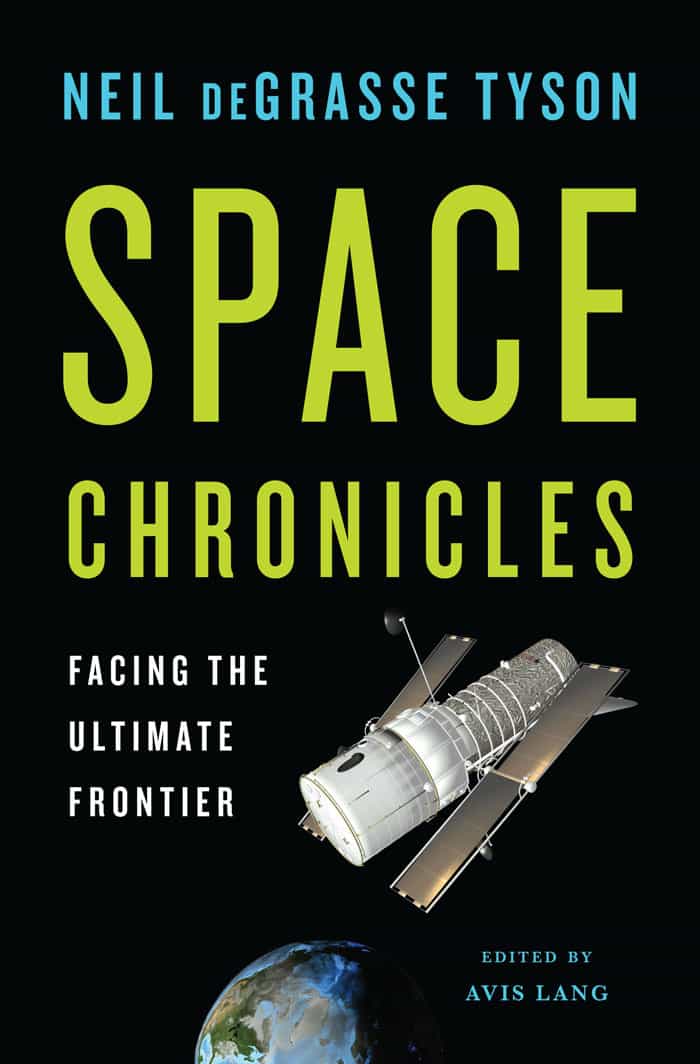Neil deGrasse Tyson's new book Space Chronicles: Facing the Ultimate Frontier (2012 W W Norton) is a collection of essays, articles and Tweets focused on the need to pursue space exploration. Aaron Leonard met with him recently in his office in the Museum of American History in New York City to discuss the book, his commitment to space exploration, the size of the Sun, and the importance of curiosity

One of the most common arguments against space funding is “We shouldn’t be spending money on space exploration until we fix things down here.” How do you respond that?
Often the person uttering that statement is missing important information. Let’s look at how much money we are spending “down here”. Typically, the person involved is concerned about the plight of the human condition, so maybe you would look at the US federal budget for monies that are allocated to social services or education. When you combine just those two, for example, you find that the US government allocates about 50 times as much money to those programmes than it does to NASA. So it is not an either/or. We are spending vastly more money on these things than we are on NASA. NASA is getting, as a fraction of the tax dollar, one-half of 1%. That paid for the space station, the space shuttles, the NASA centres, the astronauts, the Hubble Space Telescope and the Mars rovers. Now, you may not want to spend that money on space, but the very premise of the question is false.
What are the benefits of space exploration?
I know of no force of nature or culture as great as the urge to explore the cosmic unknown. If a nation says “We’re going to do this in a big way”, and in so doing advances the space frontier, that is a call to all the innovators who are out there who previously had no place to put their innovative energies. The NASA portfolio involves biologists, chemists, planetary geologists, astrophysicists, physicists, plus mechanical, electrical and aerospace engineers. All these frontiers are represented. If you stand in front of a classroom and say “We are going to Mars and I need all of these frontiers, who’s coming with us?”, you are going to get the best.
It is my opinion that if you go to space in a big way – and people know that requires innovation, discovery and achievements that are writ large in the daily newspapers – it will influence the culture in such a way that even if you are not personally engaged in space exploration, you will still want to innovate. Big, grand visions have the power to trigger a wave of innovation. If you go into space in a big way, it creates a seductive dream for the educational pipeline. You won’t need programmes to convince people that science is an interesting thing to do, they will be compelled to want to do it simply by reading the day’s headlines.
Does that also hold for other countries? There are a lot of other countries that have the economic base to reach for space and some are actually trying…
[Interrupting] No, no. They have the vision to reach for space, and their economic base grew. Yes, it helps if you have money in advance, but China has held designs on space for a long time. Their first astronaut was in 2003. They were thinking about space in the 1990s. In the late 1980s and early 1990s, were any of us thinking about China as an economic powerhouse? Well, they were! They also knew that investments in science and technology – and big, grand visions of your nation – will pump up that innovation culture and economy. It is no accident that they are making big inroads into space, and that they have the leading growth rate in the aerospace industry.
India also has plans for space, although not a manned programme that I know of. But you see India’s economy coming out of the doldrums. India was one of the big laggards among the democracies of the world. You look at graphs of their space and technology growth, and you see it is slower than that of China, but it is on its way up. They have a billion people to make it happen. Western Europe is also very active in space. Their astronauts are local heroes in every one of their countries, which is something we took for granted coming out of the Apollo programme here in the US.
The book cites the disturbing fact that one in five Americans think that the Sun revolves around the Earth. Your response is to say that “There is no excuse for thinking that the Sun, which is a million times the size of the Earth, orbits the Earth.” How do attitudes such as this change, and what do you see as your role in that process?
People say we need better education. Yes, that’s an eternal truth. I claim that if you put big visible goals up, people will want to get educated. They will not be content to be steeped in ignorance. By the way, you can’t deduce that the Sun is a million times bigger than Earth without the tools of science. That’s why it took so long for anyone to understand that. In the Bible, the Earth is created before the Sun, so this bias that the Earth is some significant object goes deep within our culture. It is a bias that is understandable because we live on the Earth, we don’t live on the Sun. We had no clue how big the Sun is or how far away it is – that only came after millennia of studies and research. So I can blame an incomplete education for the fact that someone doesn’t know the answer to that, but it’s not necessarily because they aren’t observant. You can make better teachers, but that is not going to solve the problem. What you need is to create the grand vision and then everyone will say “The universe is awesome, tell me more about it!” They will want to come to you to get the answers. Even the poet will want to understand it. They will be steeped in a culture that values that adventure.
You have this passage from a 2006 essay where you mention “Earth’s inexhaustible supply of things to notice”. What drives your curiosity?
I am certain it is because I’ve never grown up. Kids notice everything. You bring a kid into a new home – someone else’s home that doesn’t have kids – where the breakables are not protected. The kid will come in and everything is an exploration. What is this? What is that? Can I pick this up? Will this break? How much does this weigh? Can I get this dirty? Can I get this clean? Can I pull on the curtain? Kids are born curious. We beat it out of them by telling them “sit down, you might break it”. I think a scientist – speaking to other scientists – is a kid who has never grown up. It is not a question of what you have to do to keep a kid interested, it is what you have to do to the adults to get them out of the way so that the kid never stops being interested. That’s the challenge.
Buy Space Chronicles now with 25% discount for physicsworld.com readers (enter promo code WN207 at checkout)




